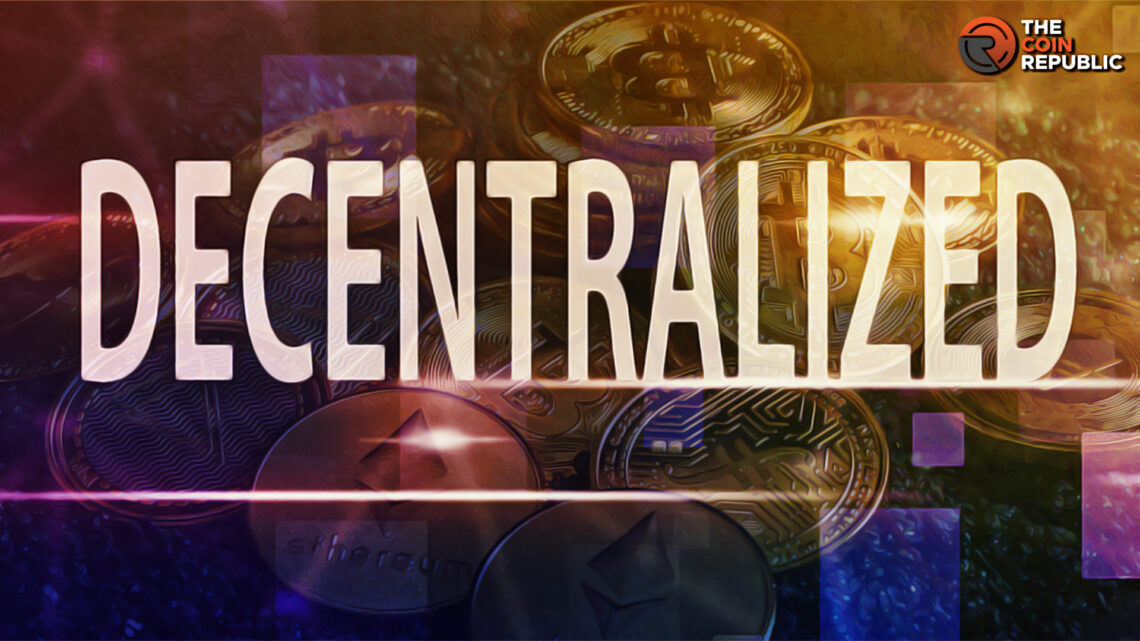- 1 Decentralized Exchange (DEX), is a peer-to-peer marketplace where transactions take place between traders.
- 2 Wide token range support and diminished security risk make DEX a significant part of the crypto world.
According to the World Bank, economies that are more engrossed in trading and investing are considered to be more productive and innovative. Trade usually advantages low-income households and is considered as buying and selling securities including bonds, stocks, currencies, and commodities. Not only in stocks, the trading concept also gained popularity in the world of cryptocurrency. All thanks go to DEX, a marketplace that allows traders to make transactions.
What is DEX?
Decentralized Exchange, also termed DEX is a peer-to-peer marketplace where crypto transactions take place directly between the traders. The inspiration to design such a marketplace originated from Ethereum Co-founder, Vitalik Buterin’s paper on DEX. With time, the concept gained more popularity and boosted the level of competition in the crypto universe. Fulfilling trader’s demands, mainly in terms of fostering financial transactions which are not associated with the banks, payment processors, brokers, or any other intermediary along with high-level security.
In the first quarter of 2021, the concept picked up hype, hitting $217 Billion in transactions flowing through decentralized exchanges. In addition to this, there were around 2 Million DeFi traders as of April 2021. Also, the total volume of DEX in September 2023 is around $29.71 Billion and is expected to break more records soon.
Uniswap, Maker PSM, PancakeSwap, Orca, and Curve are some of the most popular names in the list of Decentralized Exchanges. The total volume of Uniswap, PancakeSwap, and Maker PAS for September 2023 is $18.52 Billion, $5.73 Billion, and $1.8 Billion. Transactions in the DEX are carried out using smart contracts, and self-executing agreements.
The Complete Working of Decentralized Exchanges
Decentralized Exchanges trade cryptocurrency tokens for other cryptocurrency tokens making it dissimilar to centralized exchanges like Coinbase. Also, all the transactions over the DEX are handled by an Order Book, that represents the price of specific cryptocurrency based on present buy and sell orders.
Decentralized Exchanges are designed on top of the blockchain network which supports smart contracts, helping users keep custody of funds. In simple terms, the trader interacts with the smart contract to use DEX. Decentralized Cryptocurrency Exchanges are built on Open-Source code, helping individuals understand the complete workings of the marketplace.
Automated Market Makers (AMMs), Order book DEXs, and DEX aggregators are the main three types of Decentralized Exchanges. All three types allow users to trade directly using smart contracts. AMMs rely on smart contracts to solve the liquidity problem and mainly rely on blockchain and other platforms for exchanges and setting prices. Order Book DEX, on the other hand, compiles all the records of all open orders to buy and sell cryptocurrencies for particular asset pairs. In addition, DEX aggregate uses numerous protocols and mechanisms to resolve issues linked to liquidity and minimize slippage on large orders.
After knowing the full workings of DEX, it’s time to explore the complete workings of DEX Crypto.
How to Buy Crypto on a Decentralized Exchange
Uniswap, PancakeSwap, Curve, and dYdX are some of the common DEXs streaming in the crypto market, offering trading with cryptocurrency. Interaction with Decentralized Exchanges requires a crypto wallet such as Coinbase Wallet in the web browser or smartphone.
The very first step to initiate trading with DEX is to decide on a network over which the entire training is going to take place. Transaction fee and compatibility with the respective digital asset helps in choosing relevant platforms for crypto trading. Choosing a crypto wallet that is accordant with the chosen DEX is the next step to follow and usually helps in funding the native tokens.
The next process is to fund the wallet with the tokens which are mainly used to pay transaction fees on the respective network. The tokens can easily be identified through the ticker symbol like BTC for Bitcoin, ETH for Ether, etc., and need a shift to a centralized exchange. After successfully buying the crypto, the trader needs to withdraw the digital assets to the wallet.
Here, one point to consider is, avoiding fund shifts to the wrong network. The funded wallets are further connected with the DEXs for trading using the pop-up prompt or hitting the Connect Wallet button available on the website. Different DEXs hold different fees which are split between liquidity providers. Uniswap charges a fee of 0.3% whereas PancakeSwap charges a trading fee of 0.02%. Adding on, the ETH2 upgrade is going to lower the fees and speed up transactions.
Merits and Demerits of DEX
Decentralized Exchanges made it effective for individuals to gain crypto trading benefits. The platform offers numerous advantages including, token availability, anonymity, low security, and counterparty risk. DEXs have the potential to involve any token minted on the blockchain along with preserving the anonymity of DEXs. The platforms made it easy for traders to protect funds and establish connections with exchanges. No involvement of any intermediaries minimizes the chances of not fulfilling the part of the deal and defaults on contractual obligations.
Despite several benefits, the platform also holds some drawbacks that are somehow declining the effectiveness of DEX crypto in the marketplace. Continuous evolution with time is considered a merit as well as a demerit. In addition to this, the need for particular knowledge and skills and smart contract vulnerabilities are declining the power of DEXs in the marketplace.
Conclusion
Decentralized Exchange, a platform that made buying and selling of cryptocurrencies easier, faster, and beneficial. Some of the most common DEXs include Uniswap, Maker PSM, PancakeSwap, Orca and Curve. Creating an account on an exchange platform, connecting the crypto wallet, and transferring funds is the simple process of buying digital assets and carrying out trades. Low security risk, token availability, and anonymity are some chief benefits of DEX.

Adarsh Singh is a true connoisseur of Defi and Blockchain technologies, who left his job at a “Big 4” multinational finance firm to pursue crypto and NFT trading full-time. He has a strong background in finance, with MBA from a prestigious B-school. He delves deep into these innovative fields, unraveling their intricacies. Uncovering hidden gems, be it coins, tokens or NFTs, is his expertise. NFTs drive deep interest for him, and his creative analysis of NFTs opens up engaging narratives. He strives to bring decentralized digital assets accessible to the masses.


 Home
Home News
News










